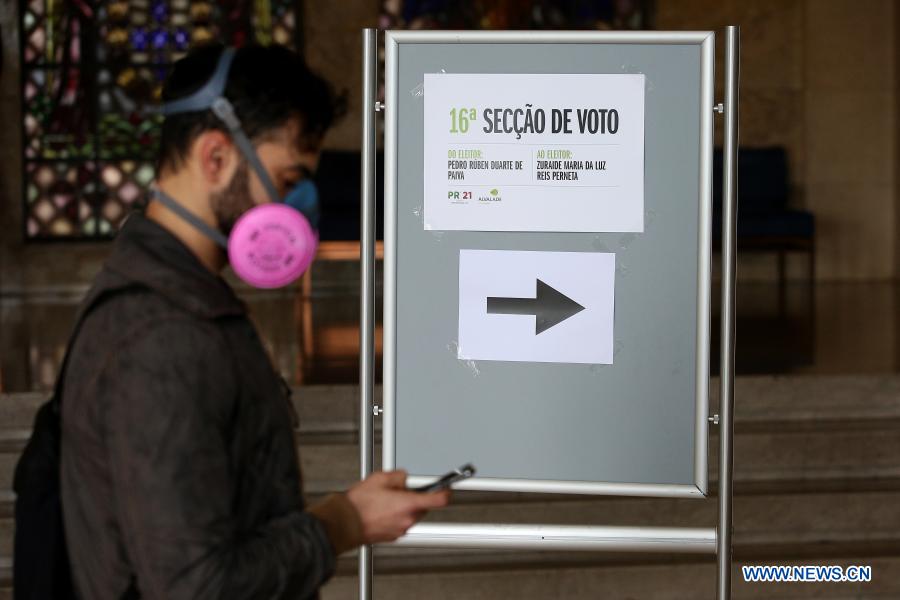


A man wearing a respirator is seen in front of a notice at a polling station in Lisbon, Portugal, on Jan. 24, 2021. Portugal's presidential election kicked off on Sunday, with nearly 11 million people eligible to vote and concerns over high abstention levels. (Photo by Pedro Fiuza/Xinhua)
LISBON, Jan. 24 (Xinhua) -- Portugal's presidential election kicked off on Sunday, with nearly 11 million people eligible to vote and concerns over high abstention levels.
Seven candidates are running for the presidency, including the current head of state, Marcelo Rebelo de Sousa, who enjoys 62 percent support in a Eurosondagem survey released on Friday.
Following Rebelo de Sousa in the polls is Ana Gomes with 14 percent support, Andre Ventura with 10 percent and Marisa Matias with 6 percent.
Some 250,000 voters had already cast early votes since Jan. 17 at over 12,000 polling stations across the country.
Voting will end at 7 p.m. local time (1900 GMT) on Sunday.
Fear of the COVID-19 pandemic and the lockdown policies to contain the spread of the virus are expected to cause a record abstention rate of 60-70 percent, experts told Xinhua.
"With a great abstention, the election is impaired, but it will not stop happening. People are afraid of COVID-19, but there is security and it doesn't take too long," Rui Rio, leader of the Social Democratic Party, the largest opposition party in Portugal, said after voting in the city of Porto.
Francisco Rodrigues dos Santos, president of the CDS-People's Party, a conservative political party in Portugal, appealed to the Portuguese to exercise their right to vote in the presidential election, which is "crucial" for the future of the country.
"I call on people to fight the virus today, complying with all public health rules and procedures, but also fight abstention," he said after voting in the capital Lisbon on Sunday morning.
However, Miguel Albuquerque, mayor of Funchal, which is the capital city of Portugal's Madeira archipelago, said the election "should have been postponed, even if it was necessary to change the constitution, because we live in new times and the rules must change."
If the abstention rate exceeds 70 percent, there would be a second round of voting between the top two candidates.
The winner of the election will assume office on March 9.

 Award-winning photos show poverty reduction achievements in NE China's Jilin province
Award-winning photos show poverty reduction achievements in NE China's Jilin province People dance to greet advent of New Year in Ameiqituo Town, Guizhou
People dance to greet advent of New Year in Ameiqituo Town, Guizhou Fire brigade in Shanghai holds group wedding
Fire brigade in Shanghai holds group wedding Tourists enjoy ice sculptures in Datan Town, north China
Tourists enjoy ice sculptures in Datan Town, north China Sunset scenery of Dayan Pagoda in Xi'an
Sunset scenery of Dayan Pagoda in Xi'an Tourists have fun at scenic spot in Nanlong Town, NW China
Tourists have fun at scenic spot in Nanlong Town, NW China Harbin attracts tourists by making best use of ice in winter
Harbin attracts tourists by making best use of ice in winter In pics: FIS Alpine Ski Women's World Cup Slalom
In pics: FIS Alpine Ski Women's World Cup Slalom Black-necked cranes rest at reservoir in Lhunzhub County, Lhasa
Black-necked cranes rest at reservoir in Lhunzhub County, Lhasa China's FAST telescope will be available to foreign scientists in April
China's FAST telescope will be available to foreign scientists in April